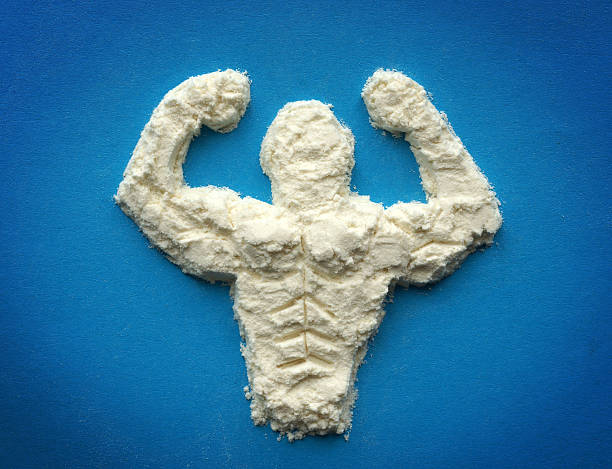Buffered Creatine vs. Creatine Monohydrate: Which is the best form of creatine?
Buffered Creatine vs. Creatine Monohydrate: Which Form is Best for You?
Buffered creatine and creatine monohydrate are two popular options for boosting performance and body composition.
This article dives into the key differences, benefits, and effects of these supplements, helping you make an informed choice.
Keep reading to learn how these forms of creatine can impact muscle creatine content, performance, and overall fitness.

Article Outline
What is Buffered Creatine?
What is Creatine Monohydrate?
How Does Buffered Creatine Compare to Creatine Monohydrate?
The Role of Kre-Alkalyn in Buffered Creatine
Effects of Creatine Supplementation on Body Composition
Is Buffered Creatine a Safer Form of Creatine?
Does Creatine Monohydrate Cause Creatinine Buildup?
Best Type of Creatine for Athletes and Bodybuilders
Common Side Effects of Creatine Supplements
How to Choose the Best Creatine for Your Goals
What is Buffered Creatine?
Buffered creatine is a modified form of creatine designed to improve stability during digestion. It often includes an alkaline agent to reduce acidity, which can minimize the conversion of creatine to creatinine.
This stability ensures more creatine reaches the muscles.
Buffered creatine is marketed as a safer form of creatine, with claims that it causes fewer side effects than creatine monohydrate.
Some users report better tolerance and fewer digestive issues.
Learn more about choosing the right type of creatine.

What is Creatine Monohydrate?
Creatine monohydrate is the most researched and widely used form of creatine. It consists of a single creatine molecule bonded to a water molecule.
This form is effective at increasing muscle creatine content, supporting performance during anaerobic exercise.
Its simplicity and proven track record make it a staple for athletes and bodybuilders seeking increased muscle mass and strength.
For more details, check out our essential guide to creatine monohydrate gummies.
How Does Buffered Creatine Compare to Creatine Monohydrate?
Buffered creatine claims to offer greater stability and reduced conversion to creatinine.
However, studies suggest that creatine monohydrate is not degraded as extensively during digestion as previously thought.
Buffered creatine may result in fewer side effects, but its efficacy in increasing muscle creatine levels is similar to that of creatine monohydrate.
Learn about creatinine and urine drug tests.

The Role of Kre-Alkalyn in Buffered Creatine
Kre-Alkalyn is a patented form of buffered creatine. It features a higher pH level, which improves its stability in solution.
Proponents suggest that Kre-Alkalyn reduces the need for high doses, making it a more efficient option for creatine supplementation.
Research on Kre-Alkalyn is limited but promising, with some studies indicating better physical and chemical properties than traditional creatine monohydrate.
Discover more in creatine myths.
Effects of Creatine Supplementation on Body Composition
Creatine supports muscle growth by increasing muscle creatine and phosphocreatine concentrations.
This results in improved energy output during high-intensity exercise.
Regular creatine use can lead to increases in muscle mass and body weight, mainly due to water retention in muscle tissue and enhanced protein synthesis.
Explore creatine supplementation benefits for muscle damage, recovery, and performance.

Is Buffered Creatine a Safer Form of Creatine?
Buffered creatine’s stability reduces the likelihood of creatinine buildup. Some users find it gentler on the stomach compared to traditional creatine monohydrate.
Despite these benefits, creatine monohydrate is considered safe when used correctly.
Side effects are rare and usually mild, such as bloating or gastrointestinal discomfort.
Read about creatine supplementation side effects.
Does Creatine Monohydrate Cause Creatinine Buildup?
The conversion of creatine to creatinine is a natural process. However, creatine monohydrate is not degraded to creatinine as significantly as some believe.
Excess creatine excretion occurs without causing harm, provided hydration levels are adequate.
Research studies on the efficacy of creatine suggest that concerns about creatinine in large amounts are unfounded. Check out creatine loading phase explained.
Best Type of Creatine for Athletes and Bodybuilders
Athletes often choose creatine monohydrate for its proven effectiveness and affordability.
Buffered creatine, including Kre-Alkalyn, appeals to those seeking fewer side effects and enhanced stability.
Various forms of creatine cater to different preferences, but creatine monohydrate remains the gold standard for performance and recovery.
Learn about creatine before bed.

Common Side Effects of Creatine Supplements
Side effects like bloating, water retention, and mild stomach upset are occasionally reported.
Buffered creatine may reduce these effects due to its pH-adjusted formulation.
Staying hydrated and starting with smaller doses can help minimize potential issues with both forms of creatine.
Discover does creatine make you poop.
How to Choose the Best Creatine for Your Goals
Consider your fitness goals and personal tolerance when selecting a creatine supplement.
Beginners may prefer creatine monohydrate for its simplicity and affordability, while those sensitive to side effects might opt for buffered creatine.
Assessing factors like cost, convenience (capsule vs. powder), and desired outcomes will guide your decision.
For detailed comparisons, read creatine powder vs. pills.

Summary of Key Points
- Buffered creatine is a modified form with enhanced stability and fewer side effects.
- Creatine monohydrate is the most researched and cost-effective option.
- Both forms effectively increase muscle creatine content and support performance.
- Buffered creatine may offer better tolerance, but research supports creatine monohydrate’s reliability.
- Consider your goals, budget, and personal response to select the best creatine supplement.
For More Training Advice + Diet and Lifestyle visit us Combat Creatine
PS: Make sure you check out the rest of our Training Guides:
Creatine
Creatine Supplements Ultimate Guide
Creatine Supplementation Side Effects
Best Creatine Monohydrate Gummies Review: Top 10 Best Creatine Gummies












